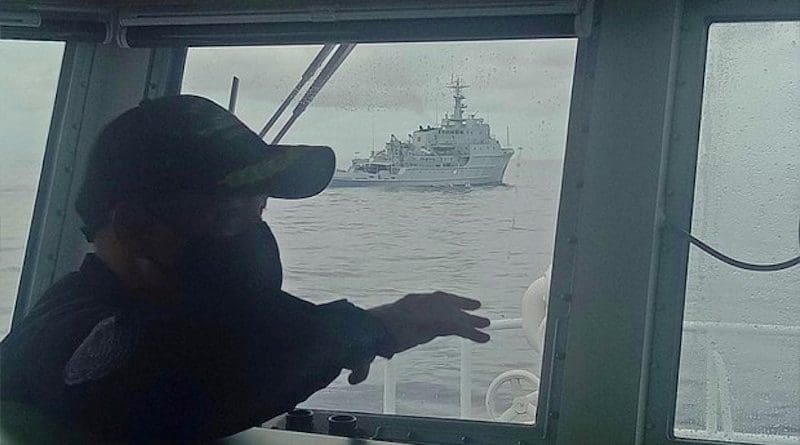Philippine Lawmakers Want To Designate Inter-Island Sea Lanes Amid Chinese Incursions
By BenarNews
By Camille Elemia
At least three Philippine lawmakers want to designate sea lanes between the country’s islands where foreign ships would be allowed to travel, amid the continued presence of Chinese vessels in Manila’s waters and adjacent territorial sea.
The lawmakers filed bills to establish what are called archipelagic lanes – with corresponding air routes – restricting foreign ships transiting through the Philippines, an archipelago with more than 7,000 islands.
Senate Minority Leader Aquilino Pimentel III, one of the lawmakers, said in his bill’s explanatory note that non-designation of archipelagic sea lanes is “detrimental to the Philippines’ interest,” as it has the effect of “waiving the right to designate in favor of other states.”
“This is to comply with provisions of the United Nations Convention on the Law of the Sea (UNCLOS), which will give us more control over the use of our maritime zones and other waters,” Pimentel told BenarNews in a text message on Friday.
The bills seek to impose a fine ranging from U.S. $600,000 (34.8 million pesos) to $1.2 million (69.6 million pesos) per violation, with one lawmaker’s bill seeking to impose prison time between six months to two years and two months, or both, depending on the gravity of offense. Foreign ships would be prohibited from conducting any oceanography or hydrographic survey or research activity unless permitted by the Philippine government, under the bills.
Maritime law analyst Jay Batongbacal told BenarNews that the bills aim to “implement Philippine rights and obligations under UNCLOS.”
Batongbacal noted that the bills do not concern the West Philippine Sea, which refers to the contested South China Sea territory claimed by Manila, but cover only “inter-island” waters.
“It would be especially helpful to clarify the obligations of foreign vessels as they pass through our waters. It is also necessary for us to better manage and address any foreign military vessel traffic,” Batongbacal said in a message to BenarNews on Friday.
Aside from China’s frequent alleged incursions in Manila’s waters in the disputed South China Sea, Beijing has encroached repeatedly in Philippine archipelagic waters, analysts said.
For instance, in 2019, Chinese warships passed through the Sibutu Passage in the southern Philippines without notifying Manila and without turning on their automatic identification system in an effort to avoid radar detection.
China then claimed its warship’s passage was legal, citing the absence of Philippine archipelagic sea lanes.
Establishing lanes where foreign ships can travel is essential for the country’s security and non-designation “will inevitably compromise the country’s security,” public policy analysts Joycee Teodoro and Florence Gamboa said last year in an analysis on the Philippine Strategic Forum.
“Non-designation will allow all foreign vessels, including foreign military ships and aircraft, to exercise normal-mode passage in all sea routes routinely used in international navigation – allowing foreign submarines to navigate underwater without showing their flag, and foreign aircraft carriers to sail with air escorts when transiting normal passage routes,” they said in their 2021 analysis.
Under international law, archipelagic waters are on the landward side of the archipelagic baselines.
Repeated Chinese incursions
Representative Rufus Rodriguez from Cagayan de Oro in southern Philippines, who has introduced his own sea lanes bill, urged Congress to approve it.
“No Chinese or any vessel should be allowed in our waters without our approval unless for innocent passage in the designated archipelagic sea lanes,” Rodriguez said in a statement on Wednesday.
Senate defense committee chairman Jinggoy Estrada issued a similar bill.
The lawmakers have cause for concern.
In March, the Philippine government summoned the Chinese ambassador over the People’s Liberation Army – Navy’s (PLAN’s) illegal incursion and lingering presence in the Sulu Sea, part of the archipelagic waters.
Before that, from Jan. 29 to Feb. 1, a Chinese reconnaissance ship with bow number 792 entered Philippine archipelagic waters without permission, officials said. The Chinese ship reached the waters of Palawan’s Cuyo Islands and Apo Island in Mindoro.
A Philippine Navy vessel challenged the Chinese ship, which claimed it was only exercising innocent passage.
“[The Chinese ship’s] movements, however did not follow a track that can be considered as continuous and expeditious, lingering in the Sulu Sea for three days,” the Philippine Department of Foreign Affairs (DFA) said in a March 14 statement.
“PLAN 792 also continued its activities in Philippine waters despite being repeatedly directed to leave Philippine waters immediately,” the DFA’s statement said, adding Manila recognized the right of innocent passage in accordance with UNCLOS.
“However, the actions of PLAN 792 did not constitute innocent passage and violated Philippine sovereignty,” the DFA said.
In his first State of the Nation Address since taking office on June 30, President Ferdinand Marcos Jr. vowed to protect Philippine territories, although he did not mention Beijing.
“On the areas of foreign policy, I will not preside over any process that will abandon even one square inch of territory of the Republic of the Philippines to any foreign power,” Marcos said in a July 25 speech before Congress.

